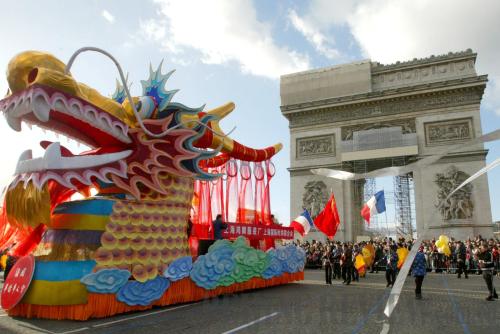|
 |
|
CULTURAL SYNERGY: A dragon float pass down the Champs Elysees Avenue in Paris during celebrations for the Chinese Spring Festival on January 24, 2004 (CFP) |
Setbacks
After establishing an official relationship, the relations between the two countries gradually got on the right track. However, Sino-French relations have not always been smooth over the past half-century. In 1992, France decided to sell arms to China's Taiwan, infringing upon China's sovereignty and interfering with its domestic affairs. China reacted with decisive measures: Some proposed joint projects were canceled; France's Consulate General in Guangzhou was closed; and bilateral exchanges above the ministerial level were shelved. The Sino-French relationship was thus badly hurt due to France's misjudgment.
It was not until early 1994, when a joint communiqué was published, that bilateral relations were once again normalized. In the document, France recognized that Taiwan is a part of the People's Republic of China and promised not to sell arms to the region again. In the more than 10 years that followed, Sino-French relations witnessed rapid progress and fruitful cooperation in various fields including politics, the economy, science and culture.
On July 1, 2008, France assumed the rotating EU presidency. It should have been a good opportunity for the then French President Sarkozy to promote relations between France and China. But he blackmailed China by saying that he would only attend the opening ceremony of the Beijing Olympics if the dialogue between the Central Government of China and the representatives of the Dalai Lama could be fruitful. Though Sarkozy later attended the ceremony, he also met with the Dalai Lama, whom the Chinese Government accuses of attempting to separate Tibet from China, that December, the first head of state of the EU presidency to do so.
Sarkozy's defiance was met with a strong reaction. China felt dissatisfied with the irresponsible moves of the French side. The planned China-EU Summit was postponed, and the then Chinese Premier Wen Jiabao's trip to Europe in early 2009 excluded France. Premier Wen later said that, when he looked at the map, he noticed that his airplane circled around France. He added, "The reason France was not included in the trip is known to all. It is not China's fault."
To restore bilateral relations, China and France issued a joint press communiqué on April 1, 2009, in which France recognized the importance and sensitivity of the Tibet issue, reaffirmed its adherence to the one-China policy and the position that Tibet is an integral part of Chinese territory, and refused to support any form of "Tibet independence."
In November 2010, the then Chinese President Hu Jintao paid a visit to France. After Hu's meeting with Sarkozy, the two countries issued a joint statement, pledging to build a new, mature and stable comprehensive strategic partnership based on mutual trust and mutual benefit. Sino-French relations thereby entered a new stage of development.
Sino-EU relations
Despite these ups and downs, both sides agree on the necessity to deepen bilateral relations further. At a time when the international political and economic pattern has undergone profound changes, it is particularly important for China and France, two permanent members of the UN Security Council, to jointly take on more responsibilities in maintaining world peace and promoting global development.
|
